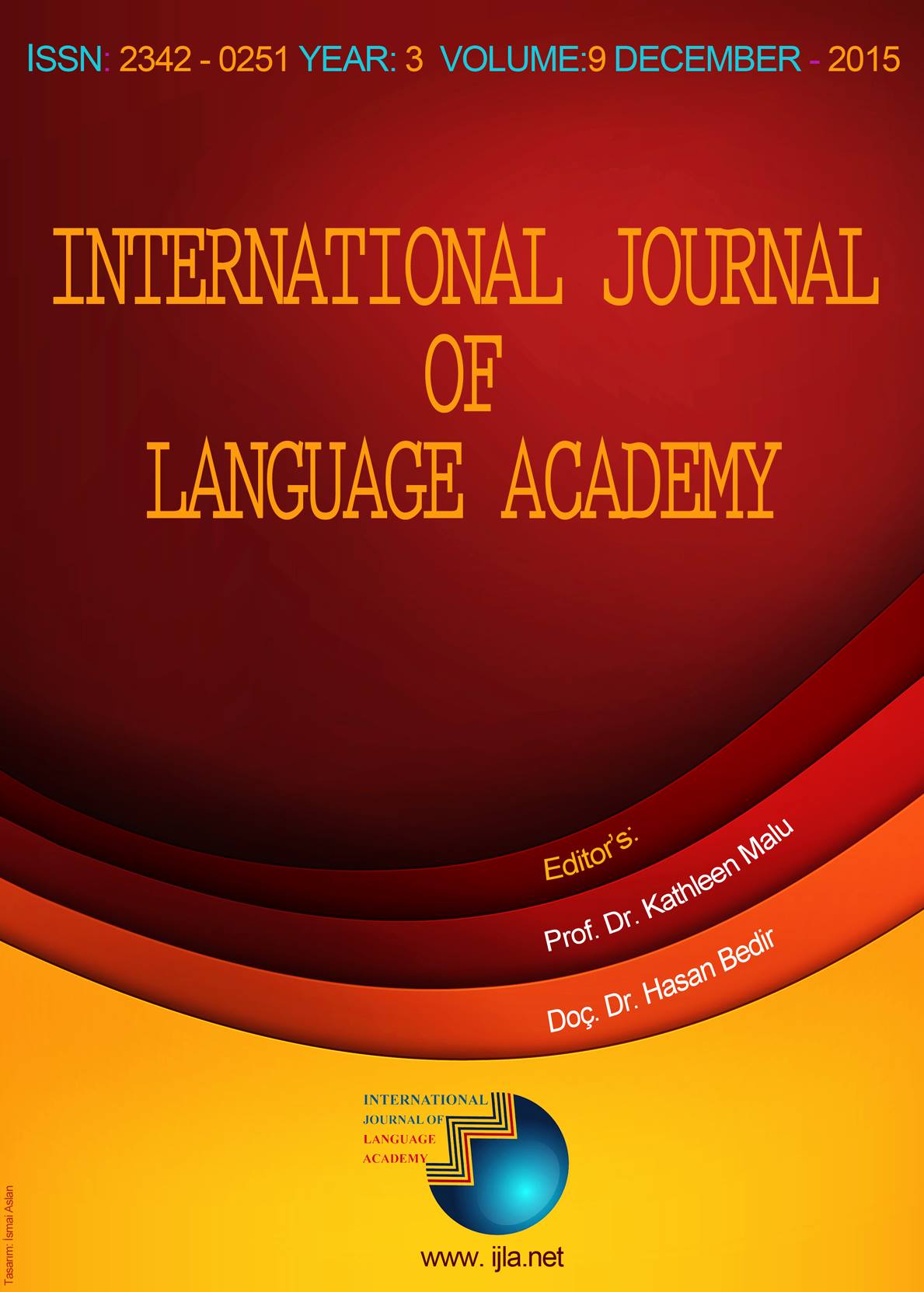RİCA İFADELERİNİN YABANCI DİL OLARAK İNGİLİZCE ÖĞRENEN ÖĞRENCİLER TARAFINDAN İNCELENMESİ: SOSYO-EDİMBİLİMSEL YAKLAŞIM
Author :
Abstract
Edimbilim, temel olarak iletişimi etkileyen sosyal ve bağlamsal faktörlerle ilgilidir. Yabancı dil öğrenenlerin edimbilimsel yeterlilikleri üzerine yapılan araştırmalar, hedef dili yabancı dil olarak öğrenenlerle ana dili olarak konuşanların edimbilimsel yeterlilik seviyelerinin oldukça farklı olduğunu göstermiştir. Bireyler anadilini edinirken o dile ait sosyal ve işlevsel kuralların soyut bilgisini de edinir. Diğer yandan, yabancı dil öğrenenler için iletişim pek de kolay değildir. Her ne kadar, dilin kurallarıyla ilgili sağlam bir bilgiye sahip olsalar da, bu kişiler iletişim esnasında diğer kişilerin anlatmak istedikleri, varsayımları ve amaçlarını kavramakta zorlanabilirler. Bu çalışmanın temel amacı, İngilizce’ yi yabancı dil olarak öğrenen başlangıç ve orta seviye öğrencilerin sosyo-edimbilimsel farkındalıklarını araştırmak ve cinsiyet ile dil yeterlilik seviyesinin istatistiksel olarak anlamlı bir farka sebep olup olmadığını ölçmektir. Veriler 25 başlangıç ve 36 orta seviye öğrenciden Ters Söylem Tamamlama Testi kullanılarak toplanmıştır. Ters Söylem Tamamlama Testi sekiz ifadeden oluşmaktadır. Katılımcılardan bu ifadelerin hangi durumlarda söylenmiş olabileceğini düşünüp yazmaları istenmiştir. Katılımcıların yanıtları, sosyal güç, sosyal mesafe ve yaptırım olmak üzere üç sosyo-edimbilimsel değişken açısından değerlendirilmiştir. Araştırma bulguları, dil yeterlilik seviyesinin öğrencilerin sosyo-edimbilimsel farkındalıklarında istatistiksel bir farka sebep olduğunu ancak cinsiyetin anlamlı bir etkisinin olmadığını göstermiştir. Konuşma sırasında geçen ifadelerde etkin olan sosyo-edimbilimsel faktörleri algılamada orta seviyedeki öğrenciler başlangıç seviyesindeki öğrencilere göre daha başarılı olmuştur. Öğretmenler, öğrencilerin edimbilimsel yeterliliklerinin geliştirilmesi için oldukça fazla zaman ve çaba harcamaları gerektiğinin farkına varmalıdır. Böylece öğrenciler etkili iletişim kurabilir ve bu iletişimi sürdürebilir.
Keywords
Abstract
Pragmatics is basically concerned with the social and contextual factors that affect communication. Research into the pragmatic competence of foreign language learners has shown that pragmatic competence levels of learners and native speakers are quite different. While acquiring the language, native speakers of a language acquire abstract knowledge of social and functional rules. However, communication is not easy for L2 learners. Because even though they develop a sound knowledge of language rules, they may have difficulty in dealing with people’s intended meanings, assumptions, and purposes while communicating. The main aim of this study is to explore elementary and intermediate EFL learners’ sociopragmatic awareness in requests and to examine whether proficiency level and gender cause any statistically significant difference. The data were gathered by a reverse discourse completion test (R-DCT) from 25 elementary and 36 intermediate level learners. R-DCT included eight statements and participants were asked to write situations in which these statements might have been uttered. Participants’ responses were assessed in terms of three sociopragmatic variables: social power, social distance and imposition. The findings of the study revealed that while proficiency creates a statistically significant difference, gender does not cause a significant difference in learners’ sociopragmatic awareness. Participants with intermediate level proficiency were more successful than participants with elementary level proficiency in designating the targeted sociopragmatic factors in conversational situations. Teachers should be aware that they need to spend considerable amount of time and energy to enhance pragmatic competence through which learners can create and maintain effective communication.
Keywords
- Akıncı-Akkurt, P. (2007). A case study on assessing pragmatic awareness of Turkish EFL learners via speech act set of complaints: A cross-cultural pragmatic perspective. Unpublished Master’s Thesis, Gazi University, Ankara.
- Bardovi-Harlig, K., & Hartford, B. (1991). Saying "no" in English: Native and non-native rejections. Pragmatics and Language Learning, 2, 41-57.
- Bardovi-Harlig, K., & Dörnyei, Z. (1998). Do language learners recognize pragmatic violations? Pragmatic vs. grammatical awareness in instructed L2 learning. TESOL Quarterly 32, 233-259.
- Blum-Kulka, S. (1982). Learning how to say what you mean in a second language. Applied Linguistics, 3, 29-59.
- Brown, P., & Levinson, S. (1987), Politeness: Some universals in language usage. Cambridge: Cambridge University Press.
- Chai, L., & Wang, Y. (2013). Interlanguage pragmatics in SLA. Theory and Practice in Language Studies, 3(1), 142-147.
- Crookall, D., & Oxford, R. L. (Eds.). (1990). Simulation, gaming, and language learning. New York: Newbury House.
- Dulay, H., Burt, M., & Krashen, S. (1982). Language two. New York: Oxford University Press.
- Crystal, D. (1997). A dictionary of linguistics and phonetics (4th ed.). Oxford: Blackwell.
- Hergüner, S. (2009). Determining the level of pragmatic awareness of Turkish ELT teacher trainees: A case study on refusals of requests. Unpublished Master’s Thesis, Gazi University, Ankara.
- Kanık, M. (2012). Reverse discourse completion tasks. Proceedings of Intercultural Competence Conference, 9(2), 93-110.
- Kasper, G. (1981). Pragmatic aspects of interlanguage. In K. Rose & G. Kasper (Eds.) 2001. Pragmatics in language teaching. Cambridge University Press.
- Kasper, G. (1997). Can pragmatic competence be taught? (NetWork #6) [HTML document]. Honolulu: University of Hawai'i, Second Language Teaching & Curriculum Center. Retrieved [21.06.2015] from the World Wide Web: www.nflrc.hawaii.edu/NetWorks/NW06/
- Olshtain, E., & Cohen, A. D. (1991). Teaching speech act behavior to non-native speakers. In M. Celce-Murcia (Ed.), Teaching English as a second or foreign language (pp. 154-165). Boston, MA: Heinle & Heinle.
- Otçu, B., & Zeyrek D. (2008). Development of requests: A study on Turkish learners of English. In M. Pützand, J.Neff-van Aertselaer (Eds.), Interlanguage and crosscultural perspectives (pp. 265-301). Berlin: Mouton De Gruyter.
- Pham, T. G. (2012). Students’ pragmatic awareness and implications for English classroom teaching at Vietnam University of Commerce. English Teaching Methodology, 60, 47-53.
- Rose, K. R. (1997). Pragmatics in teacher education for non-native speaking teachers: A consciousness raising approach. Language, Culture and Curriculum, 10, 125-138.
- Thomas, J. (1983). Cross-cultural pragmatic failure. Applied Linguistics 4(2), 91-112.
- White, R. (1993). Saying Please: Pragmalinguistic failure in English interaction. ELT Journal, 47(3), 193-202.
- Yule, G. (1996). Pragmatics. Oxford: Oxford University Press.
- APPENDIX 2 - Assessment Rubric (adapted from Kanık, 2012) Assessment Rubric Student Number:_________________ Total score: ______________ Targeted sociopragmatic factors
